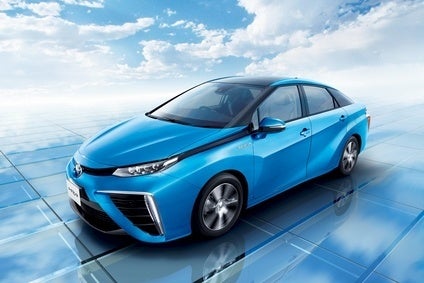Toyota recently announced that it will freely share – ‘open source’ – almost 6,000 patents it owns covering hydrogen fuel-cell technology. Dr John-Paul Rooney, a legal adviser specialising in patents, considers the commercial rationale behind Toyota’s move.
Toyota’s decision to make its fuel-cell related patents freely available is a positive move to kick-start the hydrogen fuel car market, especially in relation to hydrogen refuelling infrastructure, and is probably prompted by recognition that the vehicle manufacturer cannot open up the market on its own.
Toyota was one of the early movers in the development of hydrogen fuel technology for the car industry and in a radical step to accelerate the hydrogen economy, the company’s Vice President of automotive operations, Bob Carter, has announced plans to allow royalty-free use of approximately 5,680 fuel cell related patents. The vast majority of these patents, relating to technologies used in the manufacture of fuel cell cars, will be freely available for use until 2020. The remainder of the patents, relating to hydrogen car infrastructure, will be available on a royalty-free basis indefinitely.
This step is not unprecedented, however. Tesla’s Elon Musk made a similar move to make its patented technologies for electric cars freely available to others on an open source basis in June 2014. Of course, Tesla’s move had strings attached – notably, there was a requirement to act in good faith and companies using the patents had to make any IP generated as a result freely available too.
Taking its lead from Tesla, Toyota’s move in relation to its patented hydrogen fuel-cell and distribution technologies may be a shrewd attempt to salvage the market opportunity before it’s too late. The company launched its first hydrogen fuel-cell car, the futuristic Mirai, last year but as yet there is no market for it because there are few places to refuel. Its patent portfolio also has a sell-by date attached and some of the patents filed back in the late-90s will soon expire anyway. There is a sense that time is running out and that hydrogen car innovators are slipping behind in the race to deliver greener motoring.
Despite the pressures, Toyota’s move to open up its patent portfolio has been carefully thought through and is commercially motivated. Companies wishing to use one of Toyota’s patented technologies on a royalty-free basis will have to apply to the company first for permission to do so. The fact that the company has chosen to retain its patent portfolio rather than simply letting its renewals process lapse is also a sign that Toyota believes there is some long-term value to be gleaned from them.
Third parties choosing to make use of Toyota’s patents may be required to pay royalties from 2020 onwards, and they could even be prevented from using them after that date. There is also a strong possibility that if the hydrogen car market does take off, Toyota’s patents would form part of the ‘standard technology’ required to implement hydrogen vehicles. Either way, the company will be hoping that a lucrative revenue stream from royalties can be opened up in the future.
At a time when the electric car market is making progress and its infrastructure is becoming more visible to motorists, Toyota and others involved in the hydrogen car market will recognise that there is a lot of ground to make up. To stay in the race, hydrogen fuel infrastructure will need to come down in price significantly and the technology will need to become much cheaper and more viable for third party manufacturers. The success or failure of the hydrogen car market may well rest on what happens next and whether Toyota’s move to open up its patent portfolio creates sufficient momentum.
Dr John-Paul Rooney is a partner and patent attorney at Withers & Rogers, a leading firm of patent and trade mark attorneys.
See also:







